#also this movie was how I learned Ray Liotta was dead
Explore tagged Tumblr posts
Text
Cocaine Bear truly had everything: Matthew Rhys with a silly moustache acting high off cocaine and then promptly dying a minute into the movie, a bear that does cocaine, homoeroticism, character actress Margo Martindale, the bear indeed does cocaine, the dog doesn’t die, three bears do cocaine in fact.
#cocaine bear#matthew rhys#absolutely wild for the movie to start and then me audibly saying in a theatre hey that’s perry mason#perry mason#character actress margo martindale#movie of year no doubt#eddie and daveed#also this movie was how I learned Ray Liotta was dead#for a whole year too and i just didn’t know or i learned and forgot since then
68 notes
·
View notes
Text
“Clarice” Liveblog: Episode 1
Here are my extremely unfashionably late takes! They’re long, so strap in if you want.
okay, I genuinely thought the scenes in Gumb’s basement were ripped from the film for a second. extremely well done.
I both appreciate that they’re acknowledging the Bureau-mandated psych eval Clarice would have to go through (not sure she’d have to have another one a year later?)...
...but I sure wish they hadn’t chosen to open this show in a therapy-like session. it’s going to be subject to enough NBC comparisons as it is.
gosh, Rebecca Breeds is so pretty, and in the same almost, idk, elfin kind of way Jodie Foster is.
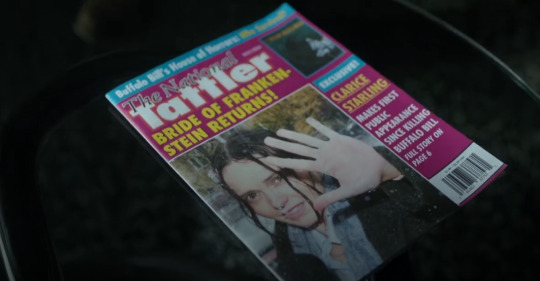
“Bride of Frankenstein”! a novel reference! and a Hannibal Lecter reference even though they can’t use his name! I’m excited
I was afraid of this part, though--everyone’s going to call her “Clarice” aren’t they?
it’s very significant that in the books, Hannibal is virtually alone in using her first name to address her; even Ardelia calls her “Starling.” but of course this series chose “Clarice” as its title, so...
“the checkout lady at the Safeway asked me to autograph a melon” omg
so Clarice has supposedly been “mandated” to see an FBI therapist for an entire year? hmm.
tbh, this feels kind of like a proxy for Hannibal’s scenes in the movie, especially with the therapist calling her “Clarice.” not sure if I dig it.
“...given that your last therapist was an inmate” Hannibal reference #2!
they’re explicitly talking about Hannibal without being able to name him and it’s hilarious, frustrating, and immensely satisfying all at once.
there’s no way to avoid talking about him altogether without being disingenuous to Clarice’s eventual character arc, so I’m glad they’re ripping off the band-aid early
“you let that relationship be intimate” Yeah, Clarice and Hannibal’s relationship IS intimate and YOU! SHOULD! SAY IT!!!
it’s kind of ridiculous for this guy/the show not to acknowledge that little trainee Clarice was sent to see Hannibal by someone who should’ve known better. That Crawford was doing it with the intention to save lives doesn’t mean he didn’t use the shit out of Clarice.
that’s not to take away her agency or minimize the choices she made after she met Hannibal. She wouldn’t have been in a position to make those choices if Crawford hadn’t arranged it, though.
even if they don’t have the rights to Crawford’s name, either (I have to assume that’s the case) couldn’t they at least mention this??
“hasn’t seen her own family in years” Are they actually going to address Clarice’s maybe-dead-maybe-not mother (depending on the canon they adopt, book or film) and possible siblings??? Please tell me they are!
Clarice’s “egregious” PTSD doesn’t have much to do with Buffalo Bill ofc, and this therapist seems to be making excuses to be the first in a long line of men getting in the way of Clarice’s career goals...
...which she recognizes and confronts him about. Call him out!!!
*Anthony Hopkins voice* That’s my girl.
the way she’s been written in this scene gives me a lot of hope going forward! she’s funny, she doesn’t take any sexist bullshit, she’s calm and polite but you get a glimpse of the rage underneath.
wow, they promoted Senator Martin to Attorney General!
the opening credits (if you can even call them that) are a let-down, though
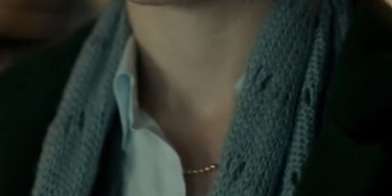
she has her beads!
can anyone who’s not Hannibal please stop calling her Clarice
wonder if they’re going to touch on any of the extreme tension that existed between Senator Martin and Clarice in the novel? they didn’t interact in the movie, but in the book, Martin is under intense stress, and it doesn’t go smoothly.
of course in “Hannibal,” Martin invites her to “ride horses,” so they obviously reconciled after Catherine’s rescue and kept in some kind of touch.
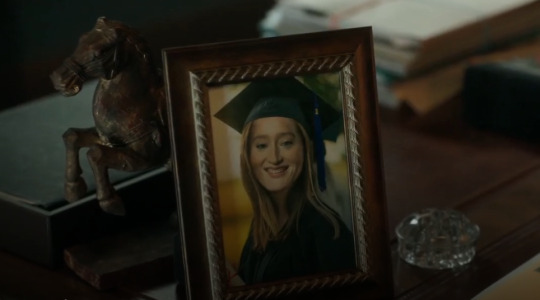
and speak of the devil: horses! (and Catherine)
“I can’t have a reputation, I’ve only done it once” Thank you for being the voice of reason, Clarice.
“Paul Krendler” *ugly screaming commences*
“you don’t have any people, Clarice” Aaand that’s the plot of the Hannibal novel!
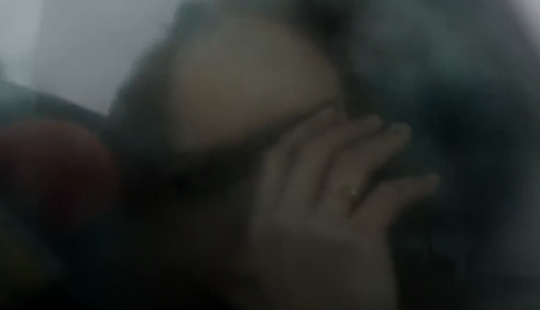
looks like they even gave her the ring Jodie’s Clarice wears!
oh yeah, this Krendler looks like a sumbitch if I ever saw one. No one will ever be as perfectly cast as the dude in Silence imo, but a much better fit than Ray Liotta.
“small carat, but it’s a sweet ring” A very in-character observation probably directly informed by her comments about nail polish in Silence.
she mentions this victim’s nail polish (!) being “tasteful,” and I shrieked a little again.
I understand it’s necessary for Krendler to be a douche, but there’s not even going to be any payoff for the audience (or Clarice) when Hannibal eats him, so boo.
wait...wait, why aren’t Clarice and Ardelia in their Alexandria duplex? They’re not just best friends, they’re roommates! For the entire seven-year story! GIVE ME THE DUPLEX!!!
BUT points for Ardelia bringing Clarice a treat, since she was always leaving her candy bars in the Silence book!
Clarice interacting with the washer/dryer is a nice nod to the books, too.
speaking of... “What did we learn in the laundry room back at Quantico?” For some reason this line made me actually cry, I guess because this whole episode has been such a love letter to something I love so dearly, and it’s making me emotional.
FIRST PRINCIPLES!
DESPERATELY RANDOM!!!
wow, the men in Clarice’s new office giving her lotion as a hazing “welcome” gift is awful, and now I’m just mad (which is the point of the scene ofc).
so this ex-military OC is the John Brigham stand-in, I take it?
if that means John Brigham won’t be here, No Thanks.
Clarice telling him she’ll drive...a tribute to Dana “Why Do You Always Have to Drive?” Scully, perhaps (who was herself inspired by Clarice) as well as a nod to Clarice’s love of cars?
“Why do they call you the bride of Frankenstein?” Sorry, I don’t have the legal rights to tell you about my last intimate relationship.
“Already on my way to West Virginia Granny Witch” Look, this show could crash and burn from this scene on, and it would still have been worth it just for these first 25 minutes.
I like that Clarice is shown wanting to help people, and the scene of her with the baby is a nice call-back to the eventual shoot-out at the beginning of “Hannibal”...but I hope they don’t try to domesticate her too much. Clarice needs her hard edges. To be tough (reasonably so)--a cub growing into its big cat’s claws.
also, somehow I doubt that Miss Valedictorian spent her six years in the Lutheran home “changing a lot of diapers,” but sure, okay. If her siblings are alive in this, she might have changed their diapers!
even though Krendler’s a real dickwad so far, he’s not slimy enough for me. Needs more grease.
“I got a call from your therapist who’s concerned that you might genuinely flip out” I really do not like this subplot Sam-I-Am. Aren’t the huge glass ceiling/Boys’ Club obstacles enough?
seriously, though, I know Hannibal tells her that the metaphorical lambs will come back--at the end of Silence, though, she’s at some kind of temporary peace, not in danger of “flipping out” any time soon.
if Esquivel really is our Brigham stand-in, I’ve got...problems with that. He was Clarice’s teacher and became her friend, not some Krendler double-agent. (Also worried they’re setting him up as a love interest for her which...eesh, no thanks.)
and sorry, I actually hate that Catherine kept Precious the dog in this.
I have no problem with Catherine being a character, or with her interacting with Clarice...that said, I don’t know if her being shown as severely traumatized and reaching out to Clarice as a form of emotional lifeline is...a good idea?
I understand the symbolism of Catherine’s smashed mirror, but...smashed mirrors are already a Thing in this series (albeit not Clarice’s chapter in it), and that’s all I can think of here.
Catherine’s a victim of unthinkable trauma. Nevertheless...she’s talking to the woman who saved her life. Who risked death to do it. I just don’t like the way this scene is written. Apparently, in this show’s canon, Catherine hasn’t gotten the help she needs. But Clarice isn’t her therapist, and it’s upsetting to have Catherine being all “I’ll never be safe and neither will you.”
how does Catherine remember “the mannequins, the autopsy table”?? And why is she throwing them in Clarice’s face?
I’m going to stop talking about this scene now because it’s making me angry and a little upset, which is maybe the point? I just don’t think it’s written well. If Catherine’s going to be a recurring character, I hope she’s shown getting professional, medical help.
Clarice finding the victim’s papers in the box of pads is a direct callback to her finding the photos in the jewelry box in Silence. Nice.
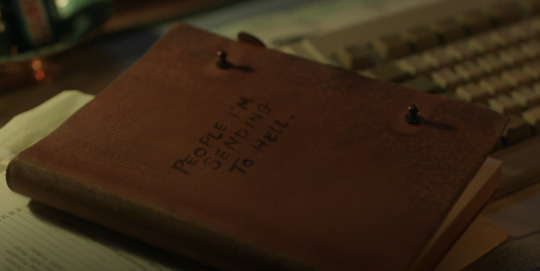
let’s agree that Hannibal and Crawford are both in Ardelia’s (too-cutesy-for-me) book
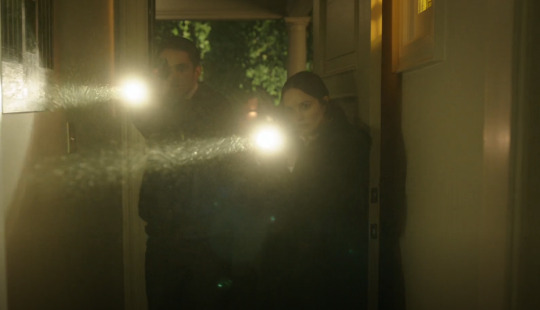
another nice little X-Files homage?
I have some qualms about that big climax, but...meh. It was capital-F Fine.
Yikes, this is a full week late. Thanks for reading this entirely-too-long post through to the end, if you’re still here!
To sum up my thoughts...
The Good:
the visual connections to the Silence film (that green coat/blue knit scarf combo in particular)
Rebecca Breeds’ performance overall so far
Clarice’s strong writing/characterization
her sense of humor and her inclination to call out bullshit
maybe it was just me, but I also got a sense of Hannibal’s influence on her in some of her dialogue--her blunt observations--and I love it
Ardelia Mapp
the repeated in-your-face references to Hannibal Lecter
the respectful, non-exploitative way the victims were treated by the narrative.
let’s just say, not all Harris-inspired shows managed to do this. :)
the many, many allusions to the novel
“you let that relationship be INTIMATE” !!!
The Bad:
the near-constant implication that all Clarice’s trauma stems from her experiences in Gumb’s basement
I just don’t understand this one...it’s not supported by the text imo
the “Clarice-is-a-psychological-loose-canon” subplot
almost everyone calling her “Clarice”
NO DUPLEX IN ALEXANDRIA! Boo!
Esquivel maybe replacing Brigham
the narrative choices they’ve made surrounding Catherine so far.
Seriously: please let Catherine seek/get help instead of screaming “HELP ME” at Clarice, who after all risked her own life to save Catherine’s, over the phone.
The Ugly: Paul Krendler, lol. Confession time: I also don’t care for the way they’ve styled her hair. Not sure why it bugs me, it just...does.
Overall, I’m thrilled to death with this. I was so afraid it would be disappointing, so even if it’s not a five-star episode (and pilots rarely are), it’s a great beginning! It’s beyond amazing to see our girl on the screen again. Just this hour-long episode did her character way more justice than the entire Hannibal film. Despite its shortcomings, it’s such a loving homage to characters and a story that mean a lot to me, and I love it just for that.
Going forward, I’d like to see more of Clarice as a person. Her hobbies and interests--cars, sharpshooting, running, fashion magazines stuffed under her bed, horseback riding, her total inability to cook...anything would do. I of course want to see more of her with Ardelia. I want to hear more about her backstory and find out which version of it (truly orphaned when her father dies or sent away by her mother) they’ll choose to explore. And while we all agree that this show is about Clarice and she don’t need no man, I won’t lie: I’d gobble up more sly references to Hannibal. He’s her endgame, after all.
I’d also like to really see the warrior underneath. There are flashes of her in the last twenty minutes of this episode. But Clarice Starling is a big cat, she’s a warrior, she’s between iron and silver. I’d hate for her to spend most of this show doe-eyed and traumatized. I want her to be ferocious, to see the woman who’s a match for the monster.
Krendler needs to get nastier. He should make us feel like we need to shower. In the novels, he wants to use Clarice--only for her body. And when she won’t allow him to, he takes his revenge. That’s what makes him so particularly awful. Let’s amp him up here.
And finally...maybe I’ll appreciate Catherine’s scene more on a second watch. Maybe I’m not being sensitive enough to her trauma, her struggles. But I didn’t like the way that scene was staged or scripted, and I didn’t like the suggestion that she just hasn’t gotten help after a year and is subsequently taking her pain out on Clarice on some level. I hope future episodes handle this subplot, and her character, a bit better.
Please let me know if you guys would like me to do another of these monstrosities for the next episode. (I promise it won’t take me an entire week this time!) And thank you again for reading!!!
#Clarice Starling#clarice#cbs clarice#rebecca breeds#media [cbs show]#char [clarice starling]#I'm sorry again about how amazingly late this is heh#you've probably all watched and processed by now and have moved on to Episode 2 but I am slow
19 notes
·
View notes
Text
Goodfellas (1990); AFI #92
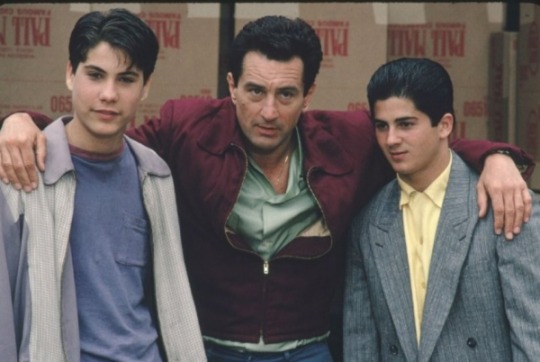
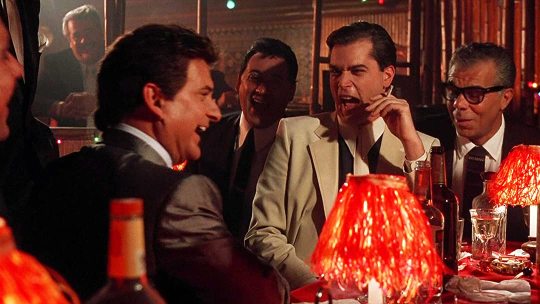
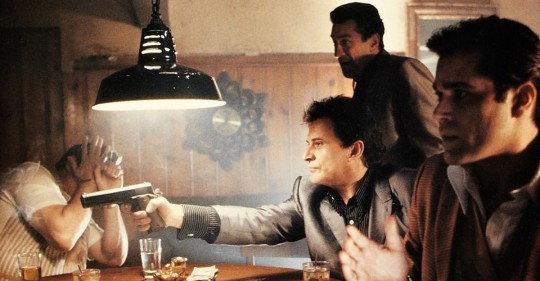
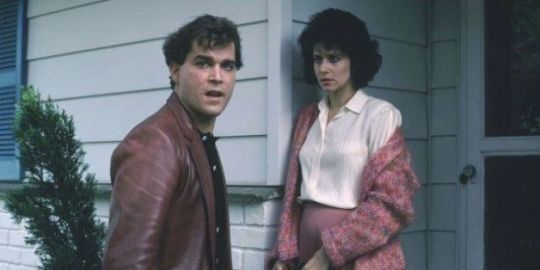
The current film up for review is Scorsese’s famous crime drama, Goodfellas (1990). It is the story of Henry Hill and how he lived through the psychotic and neurotic life of a mafia member. The film was nominated for six academy awards including Best Picture and Best Director, but only took one trophy home for Best Supporting Actor (Joe Pesci). I watched the movie 3 times over the last 2 weeks and my opinion changed from one opinion to another as I watched each time and I want to discuss why. First of all, however, we need to do summarize the plot with a standard warning...
SPOILER ALERT!!!!! I HAVE ALREADY GIVEN AWAY THE PLOT IN PREVIOUS POSTS AND I AM ABOUT TO DO IT AGAIN EVEN MORE SO!!!! CHECK OUT THE MOVIE FOR YOURSELF IF YOU HAVEN’T ALREADY!!!
-------------------------------------------------------------------------
The movie begins with three men checking the trunk of their car and finding that the body in the trunk was actually alive. Tommy (Joe Pesci) stabs the man multiple times and then Jimmy (Robert DeNiro) shoots him multiple times. Henry (Ray Liotta) looks on and explains his life in voice over and how the men all got to this position.
In 1955, a young man named Henry Hill becomes enamored with the criminal life and Mafia presence in his working class Italian-American neighborhood in Brooklyn. He gets a job working for local mob boss Paul "Paulie" Cicero (Paul Sorvino) and is introduced to the entire family. Most important were associates James "Jimmy" Conway, an Irish truck hijacker, and Tommy DeVito, a fellow juvenile delinquent. Henry begins as an errand boy for Jimmy, gradually working his way up to more serious crimes. The three associates spend most of their nights in the 1960s at the Copacabana nightclub where they can impress women. Henry starts dating Karen Friedman (Lorraine Bracco), a Jewish woman who is friends with Tommy’s current date. She is initially troubled by Henry's criminal activities but is eventually seduced by his glamorous lifestyle. She marries him, despite her parents' disapproval.
We follow Henry and his rise in the mafia along with Jimmy and his growing paranoia and Tommy with his constant chip on the shoulder. In 1970, Billy Batts, a made man in the Gambino crew who was recently released from prison, repeatedly insults Tommy at a nightclub owned by Henry; Tommy and Jimmy then beat, stab and shoot him to death. The unsanctioned murder of a made man invites retribution; realizing this, Jimmy, Henry, and Tommy cover up the murder by burying the body in Upstate New York. Six months later, however, Jimmy learns that the burial site is slated for development, prompting them to exhume and relocate the decomposing corpse. At this time, Jimmy begins watching his back, Tommy feels invincible, and Henry takes on girlfriend while Karen stays at home with the kids.
Fast forward to 1974, Karen finds out about the infidelity and harasses Henry's mistress Janice and holds Henry at gunpoint. Henry moves in with Janice, but Paulie insists that he should return to Karen after collecting a debt from a gambler in Tampa with Jimmy. The mafia is all about family and there is no divorce and appearances must be kept. Things don’t go as planned because, upon returning, Jimmy and Henry are arrested after being turned in by the gambler's sister, an FBI typist, and they receive ten-year prison sentences. In order to support his family on the outside, Henry has drugs smuggled in by Karen and sells them to a fellow inmate from Pittsburgh. In 1978, Henry is paroled and expands this cocaine business against Paulie's orders, soon involving Jimmy and Tommy.
In 1979, Jimmy organizes a crew to raid the Lufthansa vault at the JFK Airport, stealing several millions in cash and jewelry. After some members purchase expensive items against Jimmy's orders and the getaway truck is found by police, he has most of the crew murdered. This part of the film is based on a true story Jimmy, in fact killed almost a dozen people in attempt to keep things silent. In his voiceover narration, as dead bodies are being discovered all over the city, Henry theorizes that Jimmy would have killed them anyway rather than share the profits of the heist. Tommy and Henry are spared by Jimmy since they had worked so close together. Also, Henry wasn’t actually involved in robbery and Tommy is going to be a made man and Jimmy wants the connection. Tommy is eventually deceived into believing he is going to be made, but he is murdered on the way to the ceremony, leaving Jimmy devastated.
By 1980, Henry has become a nervous wreck from cocaine use and insomnia. He notices that a helicopter is following him but is trying to visit with his family and deliver drugs at the same time. He sets up a drug deal with his Pittsburgh associates, but is arrested by narcotics agents and jailed. After bailing him out, Karen explains that she flushed $60,000 worth of cocaine down the toilet to prevent FBI agents from finding it during their raid, leaving them virtually penniless. Henry has nowhere to go so he returns to Paulie to ask for help and admits to dealing under the table. Feeling betrayed by Henry's drug dealing, Paulie gives him $3,200 and ends their association. Henry meets Jimmy at a diner and is asked to travel on a hit assignment, but the novelty of such a request makes him suspicious. Henry realizes that Jimmy plans to have him and Karen killed, prompting his decision to become an informant and enroll, with his family, in the witness protection program. He gives sufficient testimony to have Paulie and Jimmy arrested and convicted. Henry is grateful to be alive, but he is forced out of his gangster life and has to readjust to normal life once again; he narrates, "I'm an average nobody. I get to live the rest of my life like a schnook."
The end title cards state that Henry is still a protected witness as of 1990, but that he was arrested in 1987 in Seattle for narcotics conspiracy, receiving five years' probation. He has been clean since then. He and Karen separated in 1989 after 25 years of marriage, while Paulie died the previous year in Fort Worth Federal Prison at age 73 from respiratory illness. Jimmy is serving a 20 years to life sentence in a New York prison for murder, in which he will be paroled in 2004, when he will be 78 years old.
-----------------------------------------------------------------------
Even more of an update from the end title cards, Henry Hill and Karen Hill divorced in 2001 and then Henry remarried and fathered one more child. Karen and her kids have lived in hiding and fear they will never escape possible retribution. Jimmy died in prison in 1996 before he was eligible for parole and Henry died in 2012 of cancer. With their history of explosive violence, I am kind of glad that all three of the main men (Tommy, Henry, and Jimmy) have shuffled off this mortal coil.
So I ended up watching this film three times in the last couple of weeks and I liked it less and less each time. So many people have such good things to say about the movies (including me), yet what the movie is most celebrated for is what I like the least. The first time I watched was with my housemates and they talked throughout the movie and laughed at the antics of Joe Pesci. I feel that many viewers enjoyed that crazy performance, and this was probably the reason for the Best Supporting Actor award. I am sure that capturing the volatile nature of a lunatic mafia hitman is very difficult and deserves praise.
I then watched it twice more to take notes on the different camera shots and then to compare to the real story of the Lucchese family and Lufthansa heist. I was not disappointed with the camera shots since Scorsese tends to let his actors go wild and then move the camera in interesting ways to capture the action while telling the story he wants to tell. He uses extreme close up shots and the vertigo trucking shot to represent the paranoia of Henry Hill and Jimmy Burke. He used the tracking shot to bring the audience into the world of the mafia man using the the character of Karen Hill as the “fish-out-of-water.” The choice of music was great including using the Sid Vicious rendition of the classic “My Way” popularized by Frank Sinatra. The colors were so bright in the beginning and became so bleak and washed out by the end. Fantastic cinematography and direction.
By the last watch, I realized that I did not like Tommy DeVito (real life name Tommy DeSimone) because he made everybody around him scared. It was like having a pet feral tiger and just hoping that he never turned on you. He was not loyal at all. In actuality, he tried to rape Karen Hill while she was married to Henry. He really killed a young bartender named Spider because Jimmy was teasing him. He brutally attacked and murdered out of anger because he was completely unhinged. Just watching Joe Pesci play the part made me anxious and I wanted him to go away every time he appeared on screen. I guess this makes him a great actor, but it also doesn’t make me want to watch his movies.
I brought this up with the Godfather movies on the list, but do Brooklyn based Italian-Americans act like these people in the movies? Constant noise in which men treat women terribly and the women go off to the kitchen and make food? I can except the loud large families and the giant shared meals, but I sure hope that the poor treatment of women and the huge lack of equality between the genders is fake or at least outdated. I have met some really nice Italian people who are nothing like the people in these films, so I believe it is a stereotype (if this is true, then Hollywood needs to stop promoting these stereotypes).
A final positive note towards the acting, I thought that Lorraine Bracco did a wonderful job as Karen Hill. She played a sheltered girl that wanted a little danger and got way more than she ever wanted. There is a scene in which she realizes that her husband is cheating and that she and her children are miserable and unprotected. She wakes up Henry with a gun in his face, but she can’t kill him because she wants that drama in her life. She is treated horribly and at one point barely walks away from a hit set up by Jimmy, yet she still stays with Henry until she is forced into the boring life of Witness Protection and she leaves him. After wading through the history of all the different characters from the movie, I actually find her story to be the most interesting.
In the end, I still want an answer for the same two questions. Does this film belong on the AFI top 100? Absolutely. It is a well made movie with a strong vision about one version of growing up in Brooklyn and how searching to realize the American dream can lead you down dark and dirty paths. Great vision by Scorsese and a well told story. Do I recommend it? Not really. I recommend doing the research on these American mobsters and get a feel for what these people were really like. I recommend checking out clips on YouTube that show the filming techniques that have become hallmarks of great directors. But don’t watch these portrayals and laugh. They are not fun or funny like they come off in the movie, these are horrible (yet interesting) people that should serve as a lesson/warning and not have their lives glamourized by Hollywood.
#goodfellas#hollywood#70s#joe pesci#ray liotta#Robert De Niro#Martin Scorsese#Oscar winner#crime drama#mafia#robbery#murder#true story#introvert#introverts
42 notes
·
View notes
Text
Biggest Movie Traitors and Backstabbers in Cinema
https://ift.tt/3u8zB6p
Last week, as part of the streaming service’s ongoing plan to bring Warner Brothers’ slate of theatrical releases to audiences at home HBO Max premiered Judas and the Black Messiah on the same day it opened in theaters. Directed by Shaka King, the incendiary historical drama centers on the rise of Fred Hampton, the charismatic Black Panther Party leader, and his tragic betrayal at the hands of FBI informant William O’Neal. Daniel Kaluuya stars as Hampton, a scorched-earth performance that attempts to recreate the magnetism and magma-like intensity of the revolutionary figure, but Kaluuya is somehow not the star of the film.
The film’s true protagonist is O’Neal, played by LaKeith Stanfield. After getting himself into some hot water, O’Neal is propositioned by FBI agent Roy Mitchell (Jesse Plemons) to either infiltrate the Black Panther Party and report back on his findings or face jail time. At first O’Neal seems to luxuriate in the kickbacks he’s given by Mitchell for his intel but he quickly learns how dangerous it is to lead a double life. O’Neal also has to try to reconcile betraying the very movement he’s spent real time and energy trying to build.
Stanfield’s performance is filled with queasy anxiety and paranoia but also cockroach-like survival tics. It’s an all-time great turncoat performance, worthy of the biblical reference in the film’s title. To honor Stanfield’s turn as “Wild” Bill O’Neil, here’s a countdown of some of cinema’s greatest backstabbers.
Fredo Corleone – The Godfather Part II (1974)
Fredo Corleone, the least intelligent and most ineffectual of Don Vito’s children, has become something of a pejorative term used against anyone deemed to be the lesser sibling in a famous family. Played with a sense of melancholy and knowing pity by esteemed character actor John Cazale, Fredo’s betrayal of his brother Michael is due more to petty jealousy than it is to Machiavellian scheming or dreams of leading the Corelone Crime Family.
As the character pathetically rages, “‘Send Fredo off to do this. Send Fredo off to do that. Let Fredo take care of some Mickey Mouse night club somewhere’… I can handle things! I’m smart! Not like everybody says!” The worst part about Fredo’s actions against his family is that it’s unclear if Fredo actually knew what was being planned against his brother or whether he was just blindly jumping at the opportunity to be important and have something for himself.
Lando Calrissian – Star Wars: The Empire Strikes Back (1980)
Perhaps the most lovable backstabber on the list, Lando at least shows some backbone and tries to make up for his nearly unforgivable alliance with the Dark Lord of the Sith, Darth Vader. While serving as Baron Administrator of Cloud City in The Empire Strikes Back, Lando is visited by Vader and bounty hunter Boba Fett and told to help trap his old friend Han Solo and the Rebels seeking sanctuary in Cloud City in exchange for the safety of the city’s citizens.
After selling his friend out, Lando has a change of heart when he overhears Han being tortured and realizes that Vader and the Empire were already reneging on their promises. He helps Leia and Chewbacca escape, and is able to evacuate Cloud City before the Empire is able to retaliate. Later he participates in the near-incompressible plot to rescue Han Solo and serves as a key general in the Rebel Alliance. Still, even back when he’s on the wrong side of the fight, Billy Dee Williams is able to turn Lando an appealing character, making his eventual redemption that much sweeter.
Henry Hill – Goodfellas (1990)
Ray Liotta plays the ultimate rat. After a long and fruitful career as a capo for local boss Paulie Cicero, Henry Hill’s mafia lifestyle comes to a final, screeching halt after he’s arrested by narcotics agents while trying to facilitate unapproved drug deals with his Pittsburgh associates. Henry’s good friend Tommy jokingly posits that Henry would crack under questioning earlier in the film, but Henry’s damning testimony against his associates Jimmy Conway and Paulie is all about survival: Henry knows that if he doesn’t cover his own ass, Jimmy will have him and his wife killed.
Read more
Culture
The Real Goodfellas: Gangsters That Inspired the Martin Scorsese Film
By Tony Sokol
Movies
The Godfather Coda: The Death of Michael Corleone Proves a Little Less is Infinitely More
By Tony Sokol
Becoming the very thing that mafioso’s hate most of all, Henry turns on his friends and is forced into the witness protection program. All Henry ever wanted was to be a gangster, but in the protection program, he’s reduced to “an average nobody. I get to live the rest of my life like a schnook.” It’s a fate that may be worse than death for him.
Mr. Orange – Reservoir Dogs (1992)
Arguably the villain of the story, depending on who’s side you’re on, Mr. Orange is actually L.A.P.D. undercover cop Freddy Newandyke. Looking to bring down crime boss Joe Cabot, Mr. Orange infiltrates his crew and takes part in diamond heist gone bad. In the ensuing chaos, Mr. Orange is shot and ends up killing an innocent civilian in retaliation. Played by Tim Roth, Mr. Orange screams and cries as he believes he’s fatally wounded, but it’s also possible that he’s airing out the guilt he feels in letting his undercover operation get so out of hand.
Without going into all of the bloodshed in the conclusion of Quentin Tarantino’s Reservoir Dogs, Mr. Orange’s double agent status is so sound that it eventually leads to the demise of almost all of Cabot’s colorful crew, and Orange then feels compelled to confess his deception, resulting in an ambiguous ending that most believe concludes with his death.
Dennis Nedry – Jurassic Park (1993)
Wayne Knight’s Dennis Nedry is probably the most cartoonish Benedict Arnold of the bunch, and if you think about it, the only human antagonist in the original Jurassic Park film, if you’re not counting short-sighted, megalomaniacal John Hammond. The slovenly Nedry is chief architect of the computer system at the fledgling Jurassic Park theme park, and he’s miffed by perceived low pay. So he decides to take an offer from Lewis Dodgson (“DODGSON, WE GOT DODGSON HERE!) of rival biotech company Biosyn to steal embryos of 15 dinosaur species in exchange for $61,500,000.
To make his grand escape with the embryos, Nedry shuts down the park’s security systems, including the electric fences surrounding the dinosaur paddocks. He also uploads a self-aggrandizing computer virus to prevent the systems from being quickly turned back on. However, a perfect combination of his own harebrained scheme and a nasty storm leaves Nedry stranded and at the mercy of a young Dilophosaurus. It does not end well.
Cypher – The Matrix (1999)
Cypher’s betrayal of the Nebuchadnezzar crew in The Matrix is pretty easy to see coming, and not just because the character is played by Joe Pantoliano, who’s portrayed many malcontents throughout his career. Cypher being a red pill dabbler and wishes he had taken the blue pill instead. He also outwardly makes his disapproval of Morpheus known throughout the movie. Using “ignorance is bliss” as his mantra, he strikes a deal with Agent Smith to return him to the Matrix and erase his memory of ever awakening from it in exchange for selling Morpheus out.
Read more
Movies
The Matrix 4 Already Happened: Revisiting The Matrix Online
By John Saavedra
Movies
Jurassic World: Top Jurassic Park Deaths by Dinosaurs
By David Crow
After tipping Smith off to a meeting with the Oracle, Cypher goes full villain and unflinchingly kills Dozer, Apoc, and Switch before finally being stopped and killed. At least he’s free from the reality he hated so much.
“Mad Eye Moody” (aka Barty Crouch Jr.) – Harry Potter and the Goblet of Fire (2005)
What’s a bigger betrayal: Death Eater Barty Crouch Jr. revealing that he’s been impersonating Alator “Mad Eye” Moody for the entirety of Harry Potter’s fourth year at Hogwarts, or Harry Potter author J.K. Rowling revealing herself to be a transphobe, betraying many of the themes of her beloved book series? We’ll leave that one to you, dear reader.
However, Barty Crouch Jr. (David Tennant before he was the Doctor) memorably betrays Harry Potter and the Hogwarts community by using the Polyjuice Potion to impersonate the former Auror and ensure that Harry would get into the Triwizard Tournament and ascend to the Third Task, which was a trap to help Lord Voldemort return to a body of his own. At least the real Mad Eye didn’t actually turn his back on those that revered him (like Rowling).
Colin Sullivan – The Departed (2006)
The biggest rat in a film full of “gnawing, cheese-eating fucking rats,” Sgt. Colin Sullivan (Matt Damon) is the criminal counterpoint to Leonardo DiCaprio’s undercover cop Billy Costigan, an undercover gangster who serves as the personal mole to Irish mob boss Frank Costello (Jack Nicholson).
Played with smarm and cowardice by Damon, Sullivan eventually double crosses the police and Costello when he discovers that Costello is an FBI informant—a rat leading rats. Scared but trying to retain his high-ranking job, Sullivan misguidedly tries to position himself as a hero and tie up all loose ends, resulting in a shocking, bloody finale that finds cocky Colin Sullivan miraculously as the last man standing. Or at least the last man standing for the moment, as a final, forgotten loose end returns to give the audience what they want; another dead rat.
Robert Ford – The Assassination of Jesse James by the Coward Robert Ford (2007)
Well, it’s all right there in the title, innit? Played with a jealous, insecure bent by a creepy (in multiple ways) Casey Affleck, Robert Ford starts off as a Jesse James fanboy, desperate to join the outlaw’s gang with his brother Charlie (Sam Rockwell). When he finally gets close to the mythical criminal (a shadowy Brad Pitt), Bob begins to resent the man, eventually brokering a deal with the Governor of Missouri to either capture or kill Jesse James in exchange for a substantial bounty and full pardon.
Read more
Movies
Hamilton: The Real History of the Burr-Hamilton Duel
By David Crow
Movies
News of the World Review: Tom Hanks Western Has Rugged Warmth
By David Crow
Bob Ford cozies up to Jesse James even further, eventually earning the man’s complete trust, before cowardly shooting the man in the back—although in the film both carry an air of expectation that it needs to happen. Ford then lives out the rest of his days known as the coward punk that betrayed Jesse James until his eventual murder.
Aaron Burr – Hamilton (2020)
Close knit allies but ideological opposites, Aaron Burr and Alexander Hamilton both fought in the Continental Army for independence from the British. However, when it came time to actual govern the new country that they fought to begin, the men drifted apart.
It’s unfair to call Burr the only backstabber in this relationship, because both men betray their former friend. Burr (Leslie Odom Jr.) becomes jealous that Hamilton (Lin-Manuel Miranda) constantly has George Washington’s ear, and switches political parties to defeat Hamilton’s father-in-law in an election, ending their mutual admiration.
Burr also inadvertently pressures Hamilton to publicly reveal an affair, which strains the rivals’ relationships even further. However, when Hamilton endorses Thomas Jefferson (Daveed Diggs) in the third presidential election, a man that he doesn’t even like, to block Burr’s political malleability from the presidency, it becomes the final straw for Burr, who challenges Hamilton to a duel. In the ensuing gunfight, Hamilton throws away his shot, and Burr seals his fate to be remembered as the villain who killed Alexander Hamilton.
cnx.cmd.push(function() { cnx({ playerId: "106e33c0-3911-473c-b599-b1426db57530", }).render("0270c398a82f44f49c23c16122516796"); });
The post Biggest Movie Traitors and Backstabbers in Cinema appeared first on Den of Geek.
from Den of Geek https://ift.tt/3s9KYZR
1 note
·
View note
Text
Movie Review: Marriage Story

One of the first things you’ll learn as you get older is that relationships don’t make a bit of sense. That’s not what you think when you’re young. That’s certainly not what Charlie and Nicole thought. They are in the middle of the end of a marriage when we meet them, a marriage that was founded on infatuation and high hopes, two things which are perfectly logical when you’re 21. We begin with a voice-over: Charlie is describing the good things about Nicole, and then Nicole describes the good things about Charlie. Over the course of the movie we will find that some of this is true, some is fancy, and some is wishful thinking.
By the time we meet Charlie and Nicole, played by Adam Driver and Scarlet Johansson, the divorce is already a thing that is going to happen. This is not a romantic comedy. Everything does not work out in the end. Noah Baumbach, who doesn’t make that kind of movie, establishes the inevitability of the outcome in subtle ways from the first shots. He shows us flashbacks of happier moments, then shows us the couple sitting at a marriage counselor’s office. Their postures are instructive. Charlie leans slightly forward, a sort of shrug-type look on his face, as if he doesn’t see what the big deal is---as if they can just work it out. Nicole leans away, her face a mask of pain and anger. Charlie doesn’t seem to notice. There is simply a feeling in the room, and viewers more attentive than Charlie know right away this film will be a rarity: a movie about a divorce where the divorce actually happens.
If you’re wondering why I find that so unique, think on what usually happens when a movie opens and a couple is on the edge of divorce. Things happen, hijinks ensue, and by the end they’ve gotten completely over whatever led them to that point to begin with.
Charlie runs a theatre company, one of the kinds that requires a lot of money be put in and puts little back out. When they were both young, Charlie gave Nicole her first big acting break, and she fell in love with him. It is never clear if the feeling was that deeply mutual. Nicole---and please forgive the stereotype here, for it is meant to be complimentary---Nicole loves in the way women do, truly and emotionally, the kind that is completely irrational and so steamrolls all rational considerations and thus removes many otherwise destructive doubts. Charlie loves her in a more utilitarian way common to men---he needs her more than he wants her, and is possessive of her the way he might be of a beloved pet. His true love is the theatre, where he can exercise total control over the outcome. A marriage does not offer him such power. Only in the case of their son Henry (Azhy Robertson) does he willingly relinquish control of a situation.
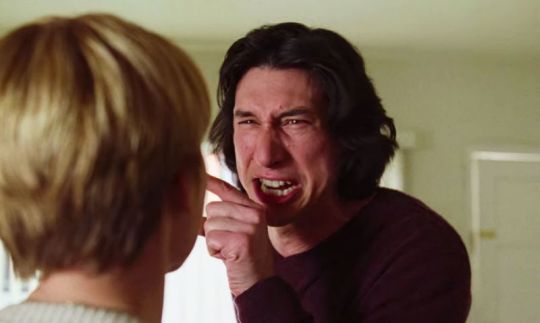
Is either of these ways of loving wrong? That seems to be the question Baumbach would like us to be thinking about. Driver and Johansson turn in two of the most stunning performances of the year, each one fully embodying their character and their hopes, fears and flaws, to the point where which one you think is the jerk may largely depend on your own life experiences. You’d be hard-pressed to deny that Charlie is a good father---Nicole does not---and that her attempts to prove otherwise for custody reasons range from passive-aggressive to blatantly manipulative. These include visiting as many lawyers as she can to establish a conflict of interest so that they cannot represent Charlie and arranging it so that he cannot both work (and thus pay legal costs) and be with Henry at the times allowed him. Nicole is conflicted about this, but she is buoyed on by her lawyer (Laura Dern), who very obviously relishes her job and loves to crush her opponents; she declares that “God is the father and God didn’t even show up”, and enjoys every bit of damage done to Charlie far too much for it to be just professional. Notably, she insists he is an absentee father while Nicole insists he isn’t, because she can win more if he is.
Charlie, meanwhile, claims to want to take the high road and not to use lawyers at all. This is less because he is noble and more because he hates facing conflict head-on. He is quick to anger and blame, and by quick, I mean instant. There are no problems in his life that aren’t caused by Nicole’s stubbornness, which is how he sees it both when she’s really being stubborn and when she isn’t. He naturally adopts the bemused expression with her of someone who believes they are always right and fancies themselves as speaking to a child who simply cannot understand all the things the adults do. He is, in a nutshell, condescending as hell, and there’s no quicker way to set him off than to remove his control. He, too, lawyers up as the movie goes on, first with a nice-but-ineffectual family lawyer (Alan Alda) and then with a bulldog (Ray Liotta) who is every bit as vicious as the Dern character, shaming Nicole for a brief scene of nudity in her first film. Somehow, there are also moments of genuine warmth and humor, but I will not ruin them.
It’s the little decisions that make all of this so effective. Baumbach and his underrated cinematographer Robbie Ryan, who shot The Favourite with an emphasis on facial expressions, know just what to do when you have an actress as expressive as Johannsson: you point the camera at her and go for a coffee. I’m sure it’s not that simple. Yet when Johansson is called upon to give Nicole a speech, the camera almost always closes in on her, to capture every subtle nod or curl of the lip and every shy turn from the viewer, as well as moments of anger and passion. The modern camera is too often terrified of shooting the human face for very long, fearful of what emotions might get in that were not scripted and focus-grouped. Compare this with Charlie. Driver is a great actor for whom facial expressiveness is, well, not a strong suit, so Baumbach and Ryan shoot him at more of a remove, fitting his superiority complex. These choices make one of the more fascinating visual contrasts I’ve seen in film, ever.
Every tension in the film and in their lives, and there are oh so many, comes out in one giant argument that, unless you’ve spent your life under a rock or are lying, we’ve all had with someone at one point. A conversation begins and escalates. In no time minor issues have become apocalyptic. All pretenses fall and each person’s basic nature is laid bare and red-faced. “I can’t believe I have to know you forever!” screams Nicole. Charlie wishes she were dead. I dare not describe how the scene culminates, even though this is not a movie with any real spoilers. Baumbach, Driver and Johansson have, together, managed to capture the essence of a real fight on film, a scene where it is hard to believe they aren’t actually a crumbling married couple really enraged with one another. After the film ended, I found myself wondering about what their relationship must be like. It took me a few moments to remember that they were not a real couple.
Verdict: Must-See
Note: I don’t use stars, but here are my possible verdicts.
Must-See
Highly Recommended
Recommended
Average
Not Recommended
Avoid like the Plague
You can follow Ryan's reviews on Facebook here:
https://www.facebook.com/ryanmeftmovies/
Or his tweets here:
https://twitter.com/RyanmEft
All images are property of the people what own the movie.
#Scarlett Johansson#adam driver#noah baumbach#laura dern#movies#marriage story#robbie ryan#ray liotta
15 notes
·
View notes